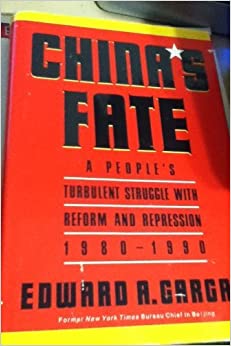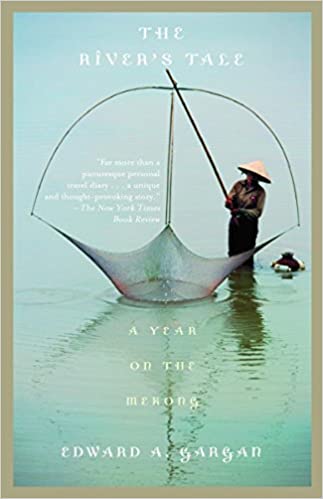Background
Edward Gargan was born on June 19, 1950, in Boston, Massachusetts. He is the son of Edward and Bernadette Gargan.

Madison, WI, United States
Edward Gargan studied at the University of Wisconsin. He got a Bachelor of Arts and a Master of Arts.
Berkeley, CA, United States
Edward Gargan studied at the University of California. He got a Doctor of Philosophy.
Edward Gargan






(Through interviews with the Chinese people, farmers, fact...)
Through interviews with the Chinese people, farmers, factory owners, cab drivers, and others, a leading journalist reveals how the Chinese have come to grips with the legacy of forty years of Communist rule.
https://www.amazon.co.uk/Chinas-Fate-Turbulent-Repression-1980-1990/dp/0385263201
1991

(Long fascinated with this part of the world, former New Y...)
Long fascinated with this part of the world, former New York Times correspondent Edward Gargan embarked on an ambitious exploration of the Mekong and those living within its watershed. The River's Tale is a rare and profound book that delivers more than a correspondent's account of a place. It is a seminal examination of the Mekong and its people, a testament to their struggles, their defeats, and their victories.
https://www.amazon.com/Rivers-Tale-Year-Mekong/dp/0375705597
2002
Edward Gargan was born on June 19, 1950, in Boston, Massachusetts. He is the son of Edward and Bernadette Gargan.
Edward Gargan graduated from the University of Wisconsin. He got there a Bachelor of Arts and Master of Arts in 1975. Also, he received a Doctor of Philosophy for the work in medieval studies at the University of California.
A longtime journalist, Edward Gargan has written two books based mostly on his experiences reporting from several Asian countries, including China. Although he studied Chinese history at the University of Wisconsin and planned on working in academia, he turned to journalism after his college years. Edward made a mark for himself working as a bureau chief for the New York Times, first in Africa, and later in China, India, and Hong Kong. Fluent in several languages, including Chinese, French, and Italian, he spent much of the late 1980s stationed in China, where he witnessed several tumultuous events, including Chinese soldiers massacring student demonstrators in Tiananmen Square in 1989.
Edward Gargan's first book, China's Fate: A People's Turbulent Struggle with Reform and Repression, includes vivid descriptions of these events. He wrote the book while serving as an Edward R. Murrow fellow in 1989-1990, a period he took off from his reporting duties. In 1991, Edward returned to the New York Times and continued with the publication for the remainder of the decade. In 2000, he joined the staff of Newsday to serve as the magazine's Asia bureau chief. Gargan's other work, the critically lauded The River's Tale: A Year on the Mekong, is a first-hand account of the 3000-mile-long journey he took down the entire length of the Mekong, Southeast Asia's longest river. Along the way, Edward Gargan visited numerous countries bordering the river, including Tibet, China, Laos, Cambodia, and Vietnam. The book contains his thoughts about the region's recent past, especially how it has been affected by incursions of the Western world.
In China's Fate, Edward Gargan portrays communist China as a nation that denies its citizens core human rights. While in the country, he witnessed countless examples of political persecution and repression, such as the Tiananmen incident and the thousands of arrests made in its aftermath. Throughout his time in China, Edward interviewed many villagers, as well as city dwellers, including prostitutes and cabbies. He also talked with dissident students and writers, clamoring for more freedom in Chinese society. Edward Gargan devotes the last section of the book to the events of Tiananmen Square and China's armed takeover and hostile subjugation of Tibet.
One of the main reasons Edward Gargan took a year to travel the Mekong and subsequently write The River's Tale was to give himself the time and luxury to strike out and find Asia on his terms, something tight newspaper deadlines never allowed him to do. The trip gave Gargan the time to fully digest his many years of covering the area for the New York Times.
Edward Gargan began his trip in Tibet, where the Mekong's headwaters converge to form the river. As in his first work, Edward discusses the effects Chinese rule has had on the ancient Tibetan culture, and its prospects are for the future. From there, he traveled south through several countries, including Laos, Cambodia, and Vietnam, each of which was tremendously impacted by the Vietnam War. In Cambodia, for example, he talked to many people who survived the country's horrific Khmer Rouge period when the communists massacred millions of Cambodians for political reasons. Ultimately Edward Gargan's journey took him to Vietnam, where the Mekong empties into the South China Sea. There, he gives an account of the communist nation's progress since the end of the war, which ended in 1975.
Edward Gargan is well known as a writer and journalist. He is currently the author of two books: China's Fate and The River's Tale. Edward was a long-time correspondent for The New York Times, serving as bureau chief in West Africa, India, Hong Kong, and China. Besides, Edward Gargan was an Edward R. Murrow fellow in 1989-1990.
(Through interviews with the Chinese people, farmers, fact...)
1991(Long fascinated with this part of the world, former New Y...)
2002In the early 1970s, Edward Gargan was sent to federal prison because he refused to serve in the Vietnam War, which he thought was an unjust conflict. Also, Edward was highly critical of both the Reagan and Bush administrations, because, in his opinion, they ignored the evidence of China's human rights abuses in the 1990s.
